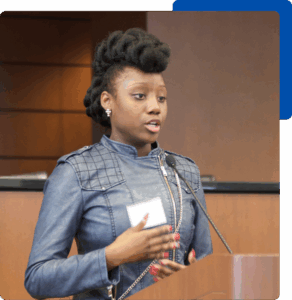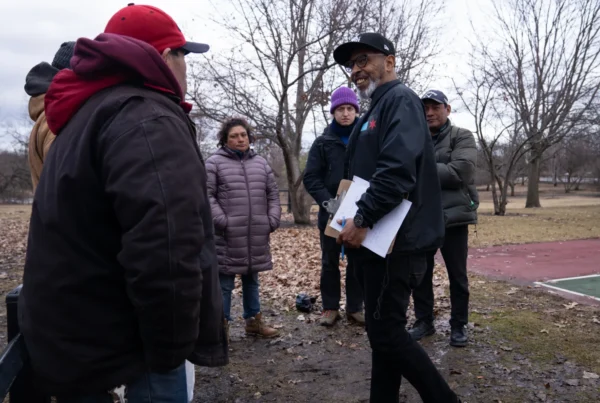
Dr. Mahalia Crawford wants her students to understand that “homelessness is not just a personal failing.” As an assistant professor of sociology at the University of Alabama, she helps them unpack the structural barriers that cause and perpetuate poverty. As a person who experienced homelessness in her youth, these issues are personal.
Born and raised on the South Side of Chicago as the youngest of seven children, Mahalia and her family navigated housing instability when she was in her teens.
“It was definitely rough, just the things I had to see,” said Mahalia. “But I had great times in Chicago as well, despite being homeless.” Mahalia doubled-up with her best friend Jade and godmom Tracey for the last two years of high school, grateful for their support along with that of her family during the hardest times.
“I still had my mom [Jeanene West], my grandmom, my siblings. We were all extremely close and encouraged each other along the way. They are the ones who showed me community first.”

Mahalia accepting her CCH scholarship in 2014.
This includes winning a renewable college scholarship from the Chicago Coalition to End Homelessness (CCH) in 2014.
“Not only did CCH help aid my matriculation in college to help pay for room and board and books, I was able to get my first ever ‘big girl’ laptop,” shared Mahalia. “Being worry-free in how I was going to pay for everything was the best, especially coming from a low-income, single parent household.”
Mahalia graduated magna cum laude with a BA in sociology in 2018 and was encouraged by her professor Dr. Walter Davis to continue her studies. She earned a master’s in sociology in 2020 from Louisiana State University, researching Black mothers who have lost children to gun violence. Mahalia went on to earn a Ph.D. in sociology with a minor in African & African American Studies in 2024.
“I met a lot of beautiful Black women in my grad program that I extremely appreciated,” said Mahalia. “We all pushed each other across the finish line.”
Today, Mahalia is proud to be the first person in her family with a Ph.D. and to be building a life that centers community and civic engagement. She remains involved with CCH by serving on a committee to choose and mentor new college scholarship winners.
“Reading their stories, it brought me back to when I applied,” said Mahalia. “It’s been a beautiful experience to touch the lives of others. Being able to have this community outside of my academic life has just been a joy.”
Mahalia recently moved closer to home so she can watch her nieces and nephews grow up and spend more time with her sisters while she continues to teach her college students online. She is also exploring ways to give back to the community that raised her.
“People need people to lean on. And I also lean on people as well,” says Mahalia. “It can be hard to ask people for help, but we need to lean on our community, to be a bit
more open.”






